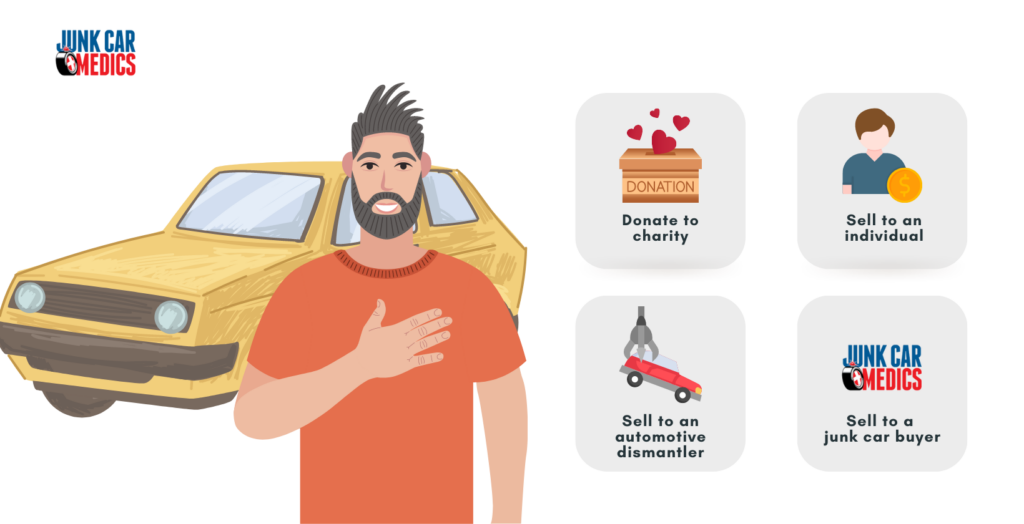Since scrapped cars are all about metal and scrapping is all about crushing, you might think of your junk car as just going off to something like a wood chipper after it has reached the end of its life (only for steel and iron).
But the process is more involved than this. After all, this isn't like removing organic material that the Earth will reclaim.
Here's What Happens to Your Car at The End of It's Life
Freon, Tires, and Battery are Removed
Scrapped cars typically start by having the freon and battery removed. If the battery or tires can be resold, they will be. Junkyard and salvage yard owners are happy to give parts another life if their journey isn't complete. You'll see this theme repeated throughout the process.
The remaining Liquids Drained and Core Parts Removed
The junkyard will have to lift the car to drain all the fluids from it, and they'll typically drill several holes to make it easier to get the oil, gas, brake fluid, etc. out. If the fluids can be reused, they will be. (Some fluids are reused as-is, while others can be mixed with other fluids to make alternative fuels.) Any usable wires are also removed and sorted through. The junkyard's actual value is ensuring that everything is properly disposed of.
If the scrapyard isn't going to resell a part, though, that doesn't mean it doesn't have value beyond that of its weight. For instance, the catalytic converter contains some of the more premium metals in the car, such as platinum. These rare metals can be used in everything from new car parts to electronics to lessen the emission volume of a vehicle. A good technician will work to extract those metals to be resold. (It's something of a pain in the neck to do, but again, it is worth the effort.)
Once the liquids are done, the next step is to remove the exhaust and the catalytic converter. The junkyard can sell these parts if they're in good shape. Once this is complete, this is generally where the engine gets ripped out of the car.
The Remaining Vehicle Shell is Crushed
Destruction comes when all of the necessary parts are stripped down. For most scrapped cars, the windows are broken, the car is crushed with a car crusher into a rectangular heap by a baler, and then it's taken to a scrap metal facility and sold by weight. Every vehicle will undergo a slightly different treatment, depending on anything from size to condition. Still, the main car recycling process will be similar if you sell the car for scrap.
Fun Facts
All right, you might not think of a scrap yard as particularly fun (the same goes for these facts), but there are a few things you might want to know:
- Dead batteries can sometimes cause some static in the recycling process. That's because the lead needs to be removed and recycled before the casing can be repurposed.
- Those old, bald tires might be recycled into a welcome mat, or they might go straight to a playground where they can protect small children from taking a tumble.
- The plastic components of many newer cars today can be turned into any number of items after they've been scrapped.
- Steel and iron typically account for more than 60% of cars. However, the proportions... are changing. In addition to using more plastic, your car may have a lot more aluminum to make it a little faster on the road. Most of that metal is put back into new car parts after it's stripped.
- The standard steel and iron can go into anything from bridges to appliances to new road signs.
Car Recycling
Recycling is big these days, not just because it's better for the environment but because it's more efficient. Why go through the process of creating a new part when the old ones can be repurposed? The right car scrapper will ensure everything is done responsibly so you get the most cash possible. (Oh, also, that the Earth doesn't explode in 15 years from sheer exhaustion.
Are All Scrapped Cars Worth the Same?
No. Some cars are inherently worth more based on their make and model, particularly when they house in-demand parts that command a high price in the market. What you get for your car comes down to the condition of many of these parts as well as the content of those parts.
With Junk Car Medics, you can rest assured that we know how to assess vehicles accurately and offer a fair price for them. While it takes a lot of effort on the technician's part to scrape a car (which ultimately does bring your offer down a little), our network is designed to be as efficient as possible. Between our reputable network of partners and fast service, we take the hassle out of selling your car without skimping on the cash in your pocket.
What To Do After I Sell My Junk Car?
You can do a few things after selling your junk car. Most importantly, notify your local DMV that you sold your junk car. Next, cancel the car insurance or transfer the car insurance to your new car if needed. Finally, the last thing you should do after selling a junk car is leave a review for the buyer.

